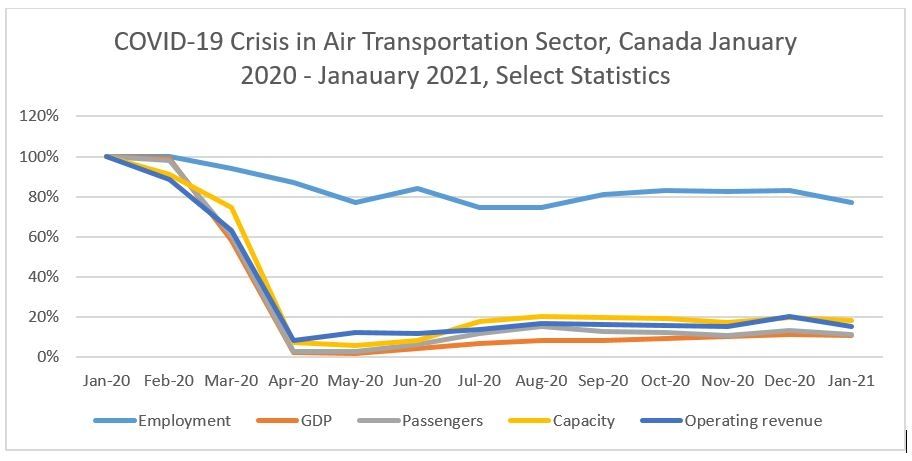
Share
It’s been more than a year since the coronavirus pandemic took hold and air transportation was severely restricted.
Statistics Canada released the latest economic statistics on air travel this week. Unsurprisingly the numbers paint a troubling picture.
Large Canadian airlines carried less than 800,000 people in January. That’s nearly 90% less than the number of passengers the same airlines carried in January 2020.Operating revenues are down 85% compared to January 2020. GDP created by the industry fell even further, to just 11% of pre-COVID levels.
Nearly one quarter of workers have been laid off.
The chart below illustrates the COVID-related economic consequences on Canada’s air transportation sector. Essentially, the industry output fell off a cliff.
Sources: Author’s calculations with data from Statistics Canada Table 14-10-0201-01, Table 23-10-0079-01 and Table 36-10-0434-01.
Unifor has been calling for a national aviation recovery plan for months. The plan includes an industry specific support package that ensures benefits flow to workers by protecting pay and working conditions in airlines, airports and navigation services and ensuring credentials are maintained. Canadians are going to want to fly again and government must ensure the industry is ready for takeoff as soon as restrictions are lifted.
The plan also calls for a science based approach to borders including rapid testing and dynamic quarantine and, most importantly, in my opinion, a vision for the future of the industry that will ensure decent work; robust health and safety standards and a thriving industry for passengers and workers.
Unifor’s air transportation members have been through crisis before.
During the 2008-09 recession, Air Canada faced $1 billion in losses and the share price dropped to $.78 cents. In 2009, our members at agreed to significant contract changes as part of an effort to save the company from bankruptcy.
By 2018, the share price and executive compensation had far surpassed merely recovering losses, but our members were forced to fight tooth and nail to recover what was lost.
During that same time, strategies to supress wages and working conditions abounded throughout the industry. At airports, contract flipping exploded.
At airlines, frozen wages and threats of contracting out were the story of the decade leaving workers to fight for scraps while profits continued to soar.
Pilots continuously face the threat of regulation that would increase fatigue and decrease safety. Those providing navigation services face constant threats of being replaced by new technology.
Air transportation workers and unions will work hard to make sure this pattern is avoided coming out of this crisis but we need an active partner in the federal government.
As a federally regulated sector, air transportation workers rely on the federal government to set the floor on wages and working conditions, health care provisions, social supports and the ability to join a union. There are numerous regulatory changes on the docket that must be acted upon soon including increasing the federal minimum wage to $15, ending contract flipping and finally implementing hours of work regulations that ensure fatigue is avoided and the industry is safe.
The post COVID-19 recovery must be very different from past recoveries that have increased deregulation, created precarious work situations and downloaded recovery costs onto workers and consumers.
That corporations will try to take advantage of the COVID-19 crisis to reset organizations and suppress wages and working conditions is not in question – it is a certainty. Federal government needs to prevent this from happening by implementing Unifor’s National Aviation Recovery Strategy and ensuring the industry Builds Back Better, not worse, from this crisis.
Unifor’s recommendations to recover and rebuild the Air Transportation sector are a part of our Road Map for a Fair, Inclusive and Resilient Economic Recovery – Unifor’s plan to Build Back Better. Find out more at buildbackbetter.unifor.org.




